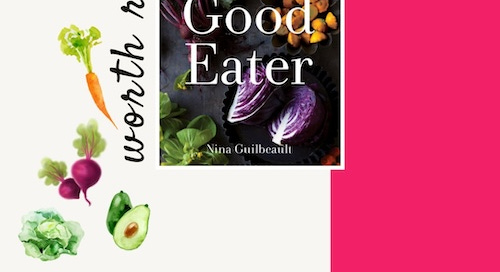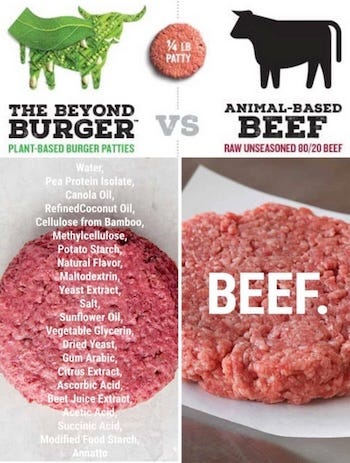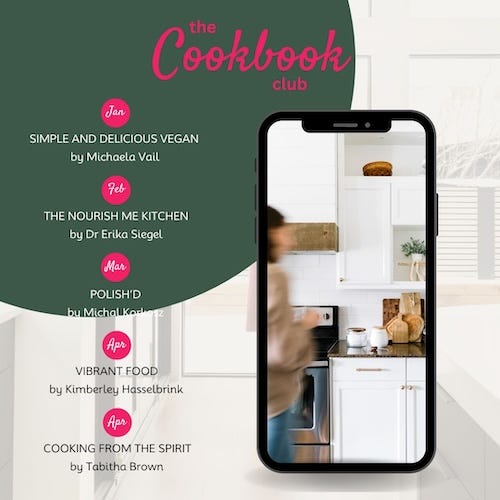Ask 100 people the best way to eat, and you’ll get 100 answers.
“Eat keto.”
“No, eat paleo.”
“A Mediterranean diet is the way to go.”
“Skip worrying about food - take a pill.”
I didn’t become plant-based overnight. It was a thirty-year transition after my dad died at the age of 54 from a massive heart attack. I learned. I changed. I grew. And slowly, the plant-based lifestyle stuck.
Looking back, I think that’s why plant-based is so powerful. You can’t lead a keto or paleo lifestyle. Instead, it’s solely a way of eating. It’s also not something you can sustain for life.
Not so with plant-based. When done right, it impacts every aspect of your life. From the cosmetics you buy to the soap you use in your washer to the foods you put on your table. Plants are all about wholeness. It’s about getting to the foundation - the Roots! - of what truly matters.
That’s how I’ve grown into my current way of thinking. And I’m always on the lookout for resources to help build on what I already know.
That’s how I came across a new book recently released. A book I couldn’t put down.
You keep learning to keep growing
(Nina Guilbeault) popped into my radar recently with her new book The Good Eater: A Vegan’s Search for the Future of Food.One of the hardest things for a plant-based eater is to stick with plant-based eating. I’ve been doing this for thirty years, moving from giving up red meat, to going vegetarian, to following a vegan diet plan, to finally putting all my focus on plant-based.
It’s taken me thirty years to get here. It’s always a work in progress. And part of me often thinks about why.
Why do some people go all-in while others have trouble, often falling back to their old routines? I liked Guilbeault’s answer.
Humans possess two “systems” of thought. System 1 is quick, instinctual, and emotional, while System 2 is slow, deliberative, and logical. When we “go with our gut,” we are operating on System 1. When we think long and hard about a problem, we are activating System 2.
The distinction between System 1 and System 2 helps to illuminate the challenge of changing our food paradigm. Our desire for calorie-dense food falls into System 1’s biases, as does our preference for food that is familiar.
We gravitate toward food we grew up with and know intimately, especially if it’s tied to nostalgic feelings of warmth and comfort. Our System 1 has also learned associations such as “tasty is good” and “meat is tasty,” therefore “meat is good.” In System 1, processing information takes almost no effort. In contrast, System 2 takes a great deal more attention and self-control. As we know, our self-control is limited, and there’s only so much effort we will put into overriding the urges of our unconscious System 1.
That makes so much sense.
At the end of the day, the last thing we want to be bothered with is more thinking, contemplating, and rationalizing what we do. We’re tired. We’re hungry. We want something familiar, something that lets us settle in and just be.
Changing everything about approach is hard enough when we spend time thinking about it. But at the end of a busy day, it’s all too much.
That’s why we pull the familiar from the pantry. Or call a number already on speed dial. Or order the same food from the same restaurant. It’s one less choice we have to make.
It’s especially hard when society pushes a System 1 approach to eating. It’s all too easy to fall back into old routines. It takes work - a lot of work - to stay dedicated to a whole foods diet.
It’s possible. You have to work at it. It’s a lifetime commitment. And that’s where System 2 comes in. It has to become ingrained into your approach to living. Hence, why a plant-based lifestyle becomes possible. It’s about everything you do.
Pay attention to comparisons …
I’m just going to say it: There’s a meme that drives me crazy. Here’s an example:
The meme gives a thumbs up to a hamburger - it’s only made from one ingredient. When compared to plant-based burgers with lots of refined and unnatural ingredients, a hamburger looks like the clear winner.
There’s a big problem with this line of thinking. Guilbeault said it so well.
… when meat proponents say that it is “just one ingredient,” they are obscuring a darker truth. Most of the animal products consumed around the world come from industrial farms, where the feed contains fertilizer residue and antibiotics, and traces of these chemicals remain in the animals’ flesh. After slaughter, meat is marinated in sodium phosphate (to retain freshness) and colored with carmine, extracted from insects, to make it appear freshly slaughtered. Some meat is also treated with modified food starch, soy protein isolate, carrageenan, gums, seasonings, and flavorings to cover up the taste of decay. That’s not even to mention the health concerns around animal protein itself, whether grass-fed or organic …
Yes, plant-based burgers are processed. But saying hamburger is one ingredient isn’t any more clear. You can’t head out into your backyard and pluck a hamburger from a tree. There’s a whole lot of processing going into production, into what finally winds up on your plate.
Not looking at it through that lens will never give you a complete picture. And for those following a plant-based lifestyle, it’s the complete picture that matters most.
I’m not saying plant-based burgers are the answer. I have a lot of concerns for what’s being produced and marketed as plant-based meat.
But I also believe in comparing apples to apples. And this meme doesn’t do it justice. It’s hiding the truth. And it’s gone viral in so many different formats.
Guilbeault covers this well in her book - it’s giving me even more things to think about as we move forward.
It’s ultimately about health
When my dad died at 54, I went on a quest to find out how such a young man could die of a massive heart attack. The answer surprised me. After deep diving into book after book, I quickly learned that heart disease wasn’t merely something associated with old age, or the genes you're born with. Ultimately, it’s about the lifestyle choices you make.
But discovering it doesn’t mean the road is crystal clear. Big Food, Big Pharma, Big Ag, they aren’t going to make things easy. There’s way too much money being made on the other side ever to allow easy changes. Guilbeault shares stories of doctors who have found this out the hard way:
Dr Ornish began setting up clinics around the country to implement his program. But even as it began to change lives for the better, he ran into a major roadblock: medical insurance. For the program to be practical, it needed to be covered by Medicare. If it wasn’t reimbursed, it wouldn’t have much effect in practice. Easy, he thought, it would take a few months. But when Dr Ornish first met with the director of Medicare in 1993, he was told, “If we cover this, anyone with a crystal and a pyramid will want us to pay for what they do.”
In the end, the process to get the Ornish program approved by Medicare turned out to take sixteen years. It required comprehensive review by learning physicians and scientists, many of them skeptical of a lifestyle-based approach, given their backgrounds in conventional medicine, which is all about pills and procedures. One of the requirements was a letter from the National Institutes of Health certifying that the program was safe. “I thought, you must be joking,” says Dr Ornish. “You mean, I need a letter to certify that it’s safe to walk, meditate, eat well, quit smoking, and love more?”
Dr Dean Ornish’s Program For Reversing Heart Disease was one of the first books I picked up after my dad died. He’s the one that led me to a lot of a-ha moments when I first made the connection that heart disease wasn’t all genetics. Lifestyle played a much bigger role.
Funny how a book thirty years later solidified so much of what I learned back then. It puts it even clearer in my mind.
If you’re looking for a book to make sense of this new path you’re on, I can’t recommend The Good Eater enough. I loved her words of wisdom, and appreciate the work she’s done. It’s on my bookshelf as one of my favorite books on food. If you’re looking for a book to add to your collection, this one’s worth investing in.
Don’t make plant-based hard …
Let’s talk a little more about plant-based, and let me give you some advice.
The biggest misconception people have about giving up animal products is that they need a different meal every meal, every day, every week, every month, every year. So they go on a quest to find dozens of cookbooks, hundreds of recipes, all to fulfill the need for food.
It’s simply not true. Instead, I always recommend people find sustainable meals. Here’s what I mean.
I’m a cereal person. Have been since I was a little girl. It’s how I was raised. It’s what I’ve always eaten.
Yes, my tastes have changed. I loved Frosted Flakes as a kid. I graduated to granola as I got older. But my love of cereal never changed.
So why try to change it?
I looked up granola recipes. I tweaked and added ingredients. Until I found my “perfect” recipe. It’s filled with nuts and seeds and quinoa and oats. I love it. I’ve been eating this for about a decade.
I combine it with a super smoothie my family started making a few years ago. My smoothie bowl - yum! I eat it every single day. It’s what I do. Even when I travel, I bring a BlendJet along to whip up an away version of what I eat at home.
It works. I like it. Why change? And why go searching for more?
That may sound boring to you if you love different breakfasts throughout the week. We’re all different. But I’d still suggest adding up how many different breakfasts you eat, and finding recipes that give you the flexibility you’re looking for.
This works for lunches, dinners, snacks, and desserts.
Don’t go hunting for different, complicated recipes for every single meal. Instead, look for your staples. The go-to recipes you use again and again. For me, it’s my chili.
I LOVE this recipe, and have used it for years. In the winter, I make it once every couple of weeks. It’s good, and it makes great leftovers. Which in turn makes for great lunches.
No thinking, just doing. That’s what the concept of “lifestyle” should be about.
It shouldn’t take a lot of bandwidth to eat better. Big Food has made it complicated at best. With thousands of choices, with dozens of ways of hiding what ingredients really are, it’s a full-time job even trying to keep up with it all.
Because I’ve found success with my own plant-based lifestyle simply by growing my favorites list of go-to recipes, I started my Cookbook Club as a way of giving you something new to draw from each month.
I love experimenting with dinner - it’s where I spend my time. A new cookbook each month gives me a chance to draw inspiration from a new source, and occasionally add to my “go-to” list.
You are following me to be alerted to each month’s Cookbook Club announcement, aren’t you? The next recommendation is coming soon … and I think you’re really going to love this one. It’s already a hit in my household.
p.s. Did you like this message? It would mean a lot to me if you’d press the ❤️ below if you liked it, left a comment 💬, or shared it with a friend. I’m trying to grow this publication, and I depend on people like you to do so!
And if you’re new here, Welcome! 💐 I’d love to start sharing my message with you if you’re interested in all things plant-powered, proaging, or finding kitchen joy. Subscribe … and then explore my entire archive! Glad to share with you! 🙋🏼♀️











Lori, I am honored that you shared my work! Thank you so much, and I'd love to connect!